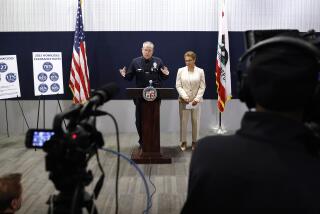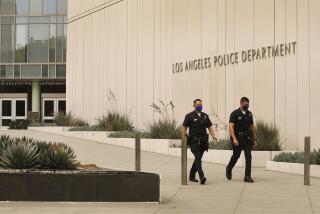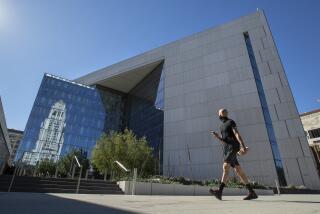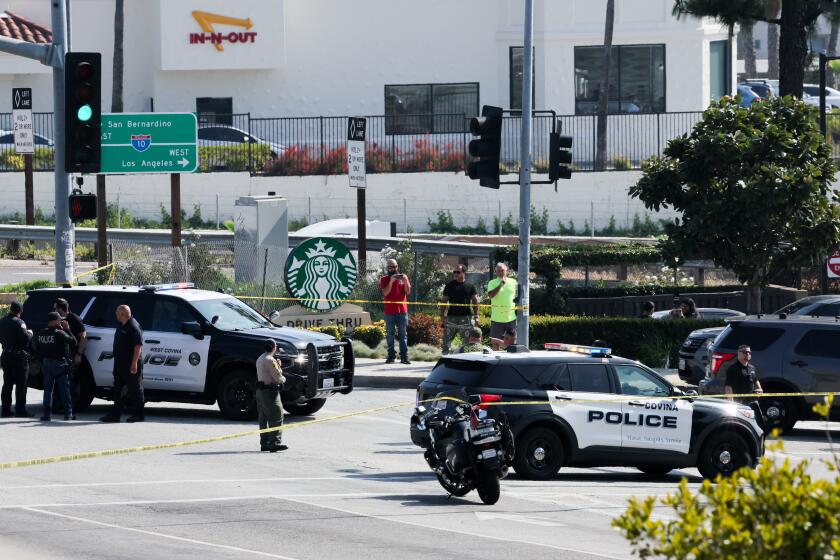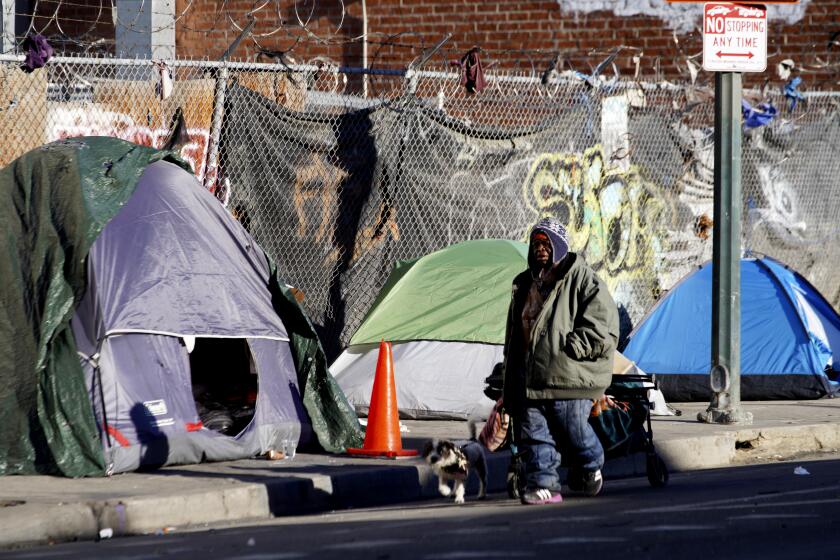Garcetti, Beck defend LAPD body camera policy
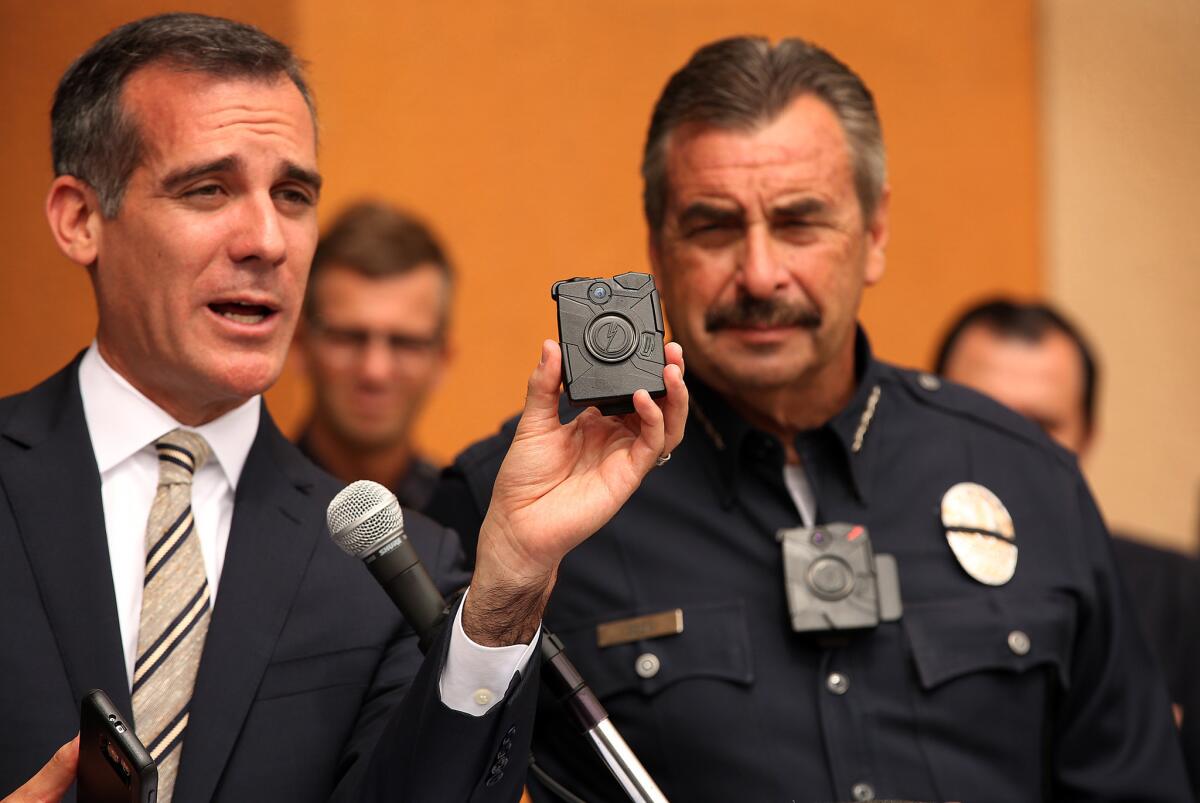
Los Angeles Mayor Eric Garcetti, left, and LAPD Chief Charlie Beck show off the police department’s new body camera. Beck is wearing one of the devices.
Los Angeles Mayor Eric Garcetti responded Friday to criticism over the LAPD’s policy on officer body cameras, saying that automatically making recordings public could violate the privacy of victims.
Garcetti defended the department’s stance in the face of criticism from the local chapter of the American Civil Liberties Union, which earlier this week sent an 11-page letter criticizing the LAPD’s policy to federal officials and urging them not to fund more of the devices for Los Angeles.
In the letter, the group said the LAPD’s decision not to make recordings public undermines “the goals of transparency, accountability and creation of public trust that body-worn cameras should serve.”
The LAPD has said it would not publicly release videos to the public from the body cameras unless required to do so through a criminal or civil court proceeding.
Garcetti -- speaking Friday at a news conference outside the LAPD’s Mission Division, where the cameras were rolled out this week -- said there will be individual cases where the city and LAPD Chief Charlie Beck would probably allow videos to be released.
NEWSLETTER: Get the day’s top headlines from Times Editor Davan Maharaj >>
“Will there be extraordinary occasions where the chief will have to use his judgment? I expect him to,” the mayor said. “If the city is about to ... erupt in violence or something where we might want to share to bring that down, absolutely.”
Garcetti said that since the cameras made their debut this week they have captured sensitive situations, including an officer responding to a domestic violence incident where he captured an altercation between a suspect and a victim.
“That is not something that should be shared publicly,” the mayor said.
“I won’t do that when there are rape victims, I won’t do that when there are domestic violence victims,” he continued. “I won’t do that when we have trials that will result [from the videos] where we need to have the evidence be untainted,” he said.
Beck said that automatically releasing videos to the public or the media could make some people fearful of reporting crimes.
“I don’t want one victim to not call the Los Angeles Police Department because she is afraid that what she reports to us will wind up on YouTube or in the public domain,” he said. “That is not fair.”
Beck said that body camera recordings will be shared with the city’s Police Commission and its inspector general. Videos will also be given to the district attorney and Los Angeles city attorney if needed for criminal or civil cases.
“These are not secret, these are not something that are cloistered by the police,” he said. “These are something that are used as evidence in a well-proven system that deals with evidence every day.”
Peter Bibring, a senior staff attorney at the ACLU’s Southern California chapter, said Garcetti and Beck are misrepresenting the ACLU’s position.
The group is not advocating for public disclosure of all video captured by body cameras, he said. Instead, Bibring said, the ACLU has called on the department to release video that captures alleged police misconduct or video requested by private individuals of their interactions with the police.
“Those are situations where the video should be released,” he said. “We have never asked for all video to be released.”
Last year, President Obama earmarked $75 million in federal funds to help local police agencies purchase the body cameras, part of his efforts to help strengthen relationships between police and the public after a series of high-profile killings by police.
Last week, the LAPD’s chief information officer told the Police Commission that the department had applied for some of the funds available and hoped to use federal money to purchase 700 cameras. The city has plans to buy 7,000 cameras for LAPD officers. Some money has been allocated in the city’s budget, but officials also are looking for outside grants.
For more Southern California news, follow @jpanzar.
ALSO
Southern California air board puts new restrictions on urban oil fields
Man convicted in kidnapping and sex assault of 10-year-old Northridge girl
L.A. mayor defends crime-fighting efforts as activists call for anti-violence summit
More to Read
Start your day right
Sign up for Essential California for news, features and recommendations from the L.A. Times and beyond in your inbox six days a week.
You may occasionally receive promotional content from the Los Angeles Times.
